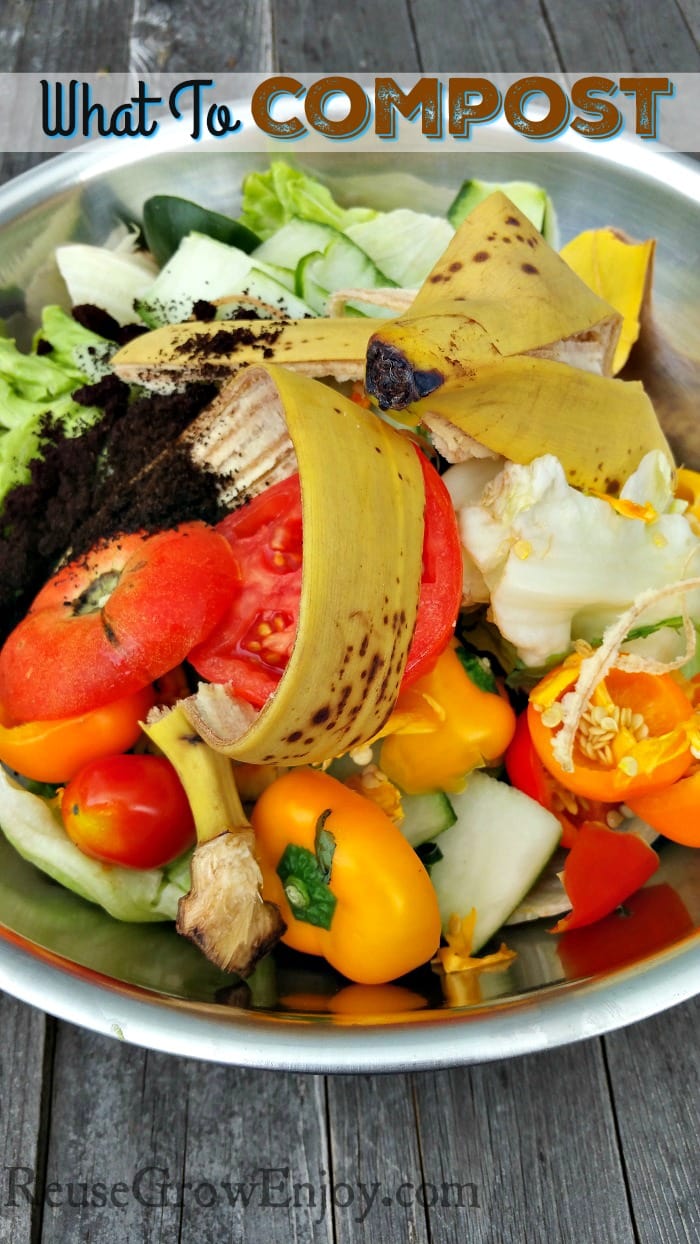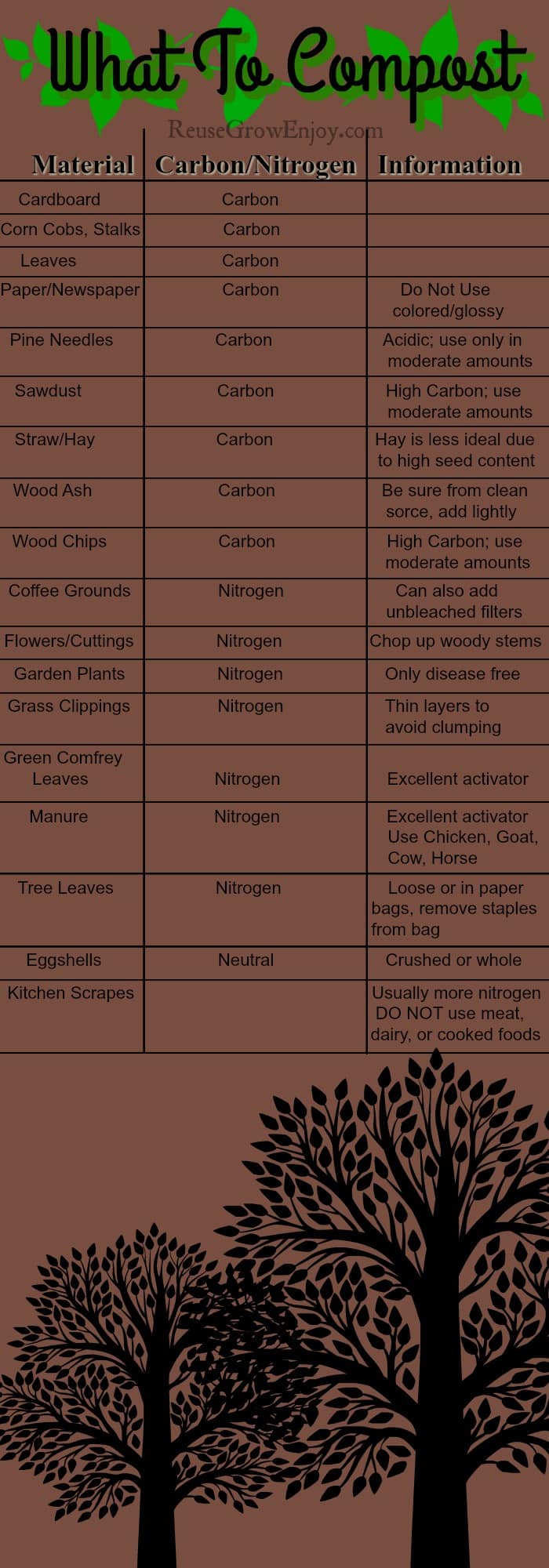So you’re ready to begin composting, good choice! Most just don’t know where to start and may ask the question can I compost eggshells or what to compost?

Composting saves you money, improves your soil, and reduces the overall impact on the environment. Adding compost to your garden will not only fertilize the soil, but it also feeds the soil with important nutrients and microorganisms that are essential for plant growth, and best of all it’s free!
But now you may be asking yourself things like, what to compost? Can I compost egg shells? Can I compost food scraps? The good news is we are going to answer all those questions and more!
Did you know people are also using compost to heat greenhouses?
How Does Compost Work & What Is The Best Practice?
The first thing to understand about what to compost is that whatever goes into your compost is basically either carbon or nitrogen-based. A healthy compost bin or compost heap needs to have more carbon than nitrogen.
In general, green materials are nitrogen-based while brown materials are carbon-based. A good rule of thumb is to use when composting is to use one-part green materials and two parts brown materials.
Green nitrogen materials are protein-rich and make enzymes while brown carbon materials add bulk that allows oxygen to penetrate and nourish organisms.
If you have too much nitrogen content and not enough carbon, your compost will be dense and decompose slowly causing it to smell. Occasionally adding a little garden soil to your compost is a good practice as it will mask odors and also help to accelerate the composting process.
Composting materials decompose at different rates and can take a long time, however, they all will break down eventually. The best way to help to speed up the composting process is to chop or shred larger material into small pieces. As the smaller pieces will break down much faster. I find a great way to do this is run most things coming out of the kitchen through the food processor.
It also helps if you turn the outdoor compost pile over about once a week. If doing it by hand is not for you, they now also sell great compost bins that make it super easy. Or you can always start a worm bin!
What Is Safe To Compost?
Eggshells:
The most common question asked is can I compost egg shells? The short answer is, yes! It is a great way to add calcium to the soil if you have a calcium deficiency.
While you can add whole egg shells if you want it does work best if you use a coffee grinder or something else to turn them into a fine powder also called eggshell powder.
That is because whole eggshells take so much longer to brake down and you can see the eggshell pieces when added to the garden. But ground eggshells blind right into the soil.
You can also use eggshell powder right in the planting hole when planting things like tomatoes. The high calcium content in the soil will help fight off things like blossom end rot.
There are a few things to keep in mind when saving your leftover eggshells. You first want to give them a quick rinse before adding them to the compost.
Also if you will be grinding them, is a good idea to dry eggshells first. Dried eggshells grind better. You can pop them in the oven for a short time to dry or simply lay them out and wait till the next day to grind them.
Coffee Grounds:
Coffee grounds make a great addition to the compost. Depending on the filter you use when making your coffee, most can be tossed right into the compost too. You do want to keep in mind that they should never be added right to the plants. They should only be added to compost and allowed to age.
Grass Clippings:
When you mow the lawn and collect the clippings you can toss them right into the compost pile.
Produce:
When fixing meals in the kitchen don’t toss out things like peels and ends. They can be added to the compost. To give you a few ideas you can use things like banana peels, lettuce ends, sweet potatoes, raw potato skins, apple cores, pepper ends, and other food waste in compost.
Plants:
When you clean the garden at the end of the growing season, you can add it to the compost. Just remember not to add any garden plants that are diseased.
Manure:
If you have livestock then you have plenty of manure. That is wonderful organic matter to add. Just know that not all poop is equal. You should never add cat or dog, or human feces to the compost.
Also know that if you add chicken poop it will need to rest/compost longer as it is considered hot manure whereas cows, horses, sheep and so on can be used right away.
Paper & Cardboard:
No need to toss out old mail, newspaper, or cardboard when it can be composted. Just be sure to remove any tape from the cardboard and not to any glossy paper or envelopes with plastic windows.
Leaves:
Leaves can also be added to the pile. You do however want to make sure you have a good mixture of other items too.
Wood Ashes:
Wood ash is a great way to add essential nutrient to the compost such as lime and potassium. Ashes have more alkaline in them to help offset the more acidic items in the pile.
The ashes used should only come from untreated wood. Because ashes will raise the soil ph, it should never be added directly. That is unless you have done a soil test and know that the ph of the soil needs to be strongly increased.
Do Not Add These Things To Compost:
Do not compost meat, chicken or fish scraps, or raw eggs and egg whites as they could add salmonella bacteria and other diseases to the soil.
You also never want to compost dairy products like milk, yogurt, or old cheese.
You also should not add diseased plants, black walnut leaves, cooked foods, or house pet manures. When we say cooked foods it means all cooked foods and not just meats. So no cookies, cakes, pies, breads, rice, and so on.
You also want to avoid adding glossy paper or magazines or any type of plastic.
Never use treated wood ashes or charcoal ashes.
To help you know what to compost and what it provides to the soil below is a chart that you can pin, print, or bookmark to have on hand.
Best Results For Pest Control:
One thing that is often overlooked when it comes to composting is the common pests that come along with it.
Because we are adding yummy items such as produce to the pile animals such as mice, rats, raccoons, opossums, and even bears will treat your compost as a buffet.
A great tip to help this from becoming an issue is to make sure you do not have your compost near your house.
Another is to have your compost be as smell-free as possible by maintaining a good mixture of carbon and nitrogen. As we said above you should stick to 1 part nitrogen to 2 parts carbon.
If the area you live in is known to have bears you may even want to take the extra steps of setting up a bear-proof area for composting.
If you like this post, you may also want to check out Best Natural Fertilizer For Your Garden or 7 Places To Find FREE Gardening Plants.



S. Davis says
LOVE your chart, it would be cute to printout and frame as a compost reminder!
Reuse Grow Enjoy says
Thanks!
Nancy A. says
Helpful info. So glad you posted it. One question though, by garden plants do you mean alll veggie and fruit scraps?
Reuse Grow Enjoy says
Hi Nancy, when I say garden plants it can be anything you have planted in the garden as long as the plants are not diseased. This works really well for the end of the season when you are clearing out the garden.